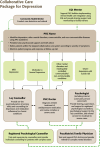Collaborative implementation of an evidence-based package of integrated primary mental healthcare using quality improvement within a learning health systems approach: Lessons from the Mental health INTegration programme in South Africa
- PMID: 38633025
- PMCID: PMC11019379
- DOI: 10.1002/lrh2.10389
Collaborative implementation of an evidence-based package of integrated primary mental healthcare using quality improvement within a learning health systems approach: Lessons from the Mental health INTegration programme in South Africa
Abstract
Introduction: The treatment gap for mental health disorders persists in low- and middle-income countries despite overwhelming evidence of the efficacy of task-sharing mental health interventions. Key barriers in the uptake of these innovations include the absence of policy to support implementation and diverting of staff from usual routines in health systems that are already overstretched. South Africa enjoys a conducive policy environment; however, strategies for operationalizing the policy ideals are lacking. This paper describes the Mental health INTegration Programme (MhINT), which adopted a health system strengthening approach to embed an evidence-based task-sharing care package for depression to integrate mental health care into chronic care at primary health care (PHC).
Methods: The MhINT care package consisting of psycho-education talks, nurse-led mental health assessment, and a structured psychosocial counselling intervention provided by lay counsellors was implemented in Amajuba district in KwaZulu-Natal over a 2-year period. A learning health systems approach was adopted, using continuous quality improvement (CQI) strategies to facilitate embedding of the intervention.MhINT was implemented along five phases: the project phase wherein teams to drive implementation were formed; the diagnostic phase where routinely collected data were used to identify system barriers to integrated mental health care; the intervention phase consisting of capacity building and using Plan-Do-Study-Act cycles to address implementation barriers and the impact and sustaining improvement phases entailed assessing the impact of the program and initiation of system-level interventions to sustain and institutionalize successful change ideas.
Results: Integrated planning and monitoring were enabled by including key mental health service indicators in weekly meetings designed to track the performance of noncommunicable diseases and human immunovirus clinical programmes. Lack of standardization in mental health screening prompted the validation of a mental health screening tool and testing feasibility of its use in centralized screening stations. A culture of collaborative problem-solving was promoted through CQI data-driven learning sessions. The province-level screening rate increased by 10%, whilst the district screening rate increased by 7% and new patients initiated to mental health treatment increased by 16%.
Conclusions: The CQI approach holds promise in facilitating the attainment of integrated mental health care in resource-scarce contexts. A collaborative relationship between researchers and health system stakeholders is an important strategy for facilitating the uptake of evidence-based innovations. However, the lack of interventions to address healthcare workers' own mental health poses a threat to integrated mental health care at PHC.
Keywords: integrated mental health care; quality improvement; task‐sharing.
© 2023 The Authors. Learning Health Systems published by Wiley Periodicals LLC on behalf of University of Michigan.
Conflict of interest statement
The authors declare no conflicts of interest.
Similar articles
-
A learning health systems approach to scaling up an evidence-based intervention for integrated primary mental healthcare case finding and referral in South Africa.BMJ Glob Health. 2024 Oct 22;9(10):e015165. doi: 10.1136/bmjgh-2024-015165. BMJ Glob Health. 2024. PMID: 39438070 Free PMC article.
-
Challenges and opportunities for implementation and dissemination of a task- sharing counselling intervention for depression at primary health care level in South Africa.Int J Ment Health Syst. 2023 Mar 30;17(1):7. doi: 10.1186/s13033-023-00575-w. Int J Ment Health Syst. 2023. PMID: 36998053 Free PMC article.
-
Implementation and Scale-Up of Integrated Depression Care in South Africa: An Observational Implementation Research Protocol.Psychiatr Serv. 2021 Sep 1;72(9):1065-1075. doi: 10.1176/appi.ps.202000014. Epub 2021 Mar 11. Psychiatr Serv. 2021. PMID: 33691487 Free PMC article.
-
Key influences in the design and implementation of mental health information systems in Ghana and South Africa.Glob Ment Health (Camb). 2016 Apr 8;3:e11. doi: 10.1017/gmh.2016.3. eCollection 2016. Glob Ment Health (Camb). 2016. PMID: 28596880 Free PMC article. Review.
-
Rapid evaluation of the Special Measures for Quality and challenged provider regimes: a mixed-methods study.Health Soc Care Deliv Res. 2023 Oct;11(19):1-139. doi: 10.3310/GQQV3512. Health Soc Care Deliv Res. 2023. PMID: 37921786 Review.
Cited by
-
Perceptions of psychiatric-trained nurses on integrating mental health into primary health care in Africa.Health SA. 2025 Feb 28;30:2878. doi: 10.4102/hsag.v30i0.2878. eCollection 2025. Health SA. 2025. PMID: 40062346 Free PMC article. Review.
-
Learning health systems for community-based mental health.World Psychiatry. 2025 Feb;24(1):50-51. doi: 10.1002/wps.21268. World Psychiatry. 2025. PMID: 39810654 Free PMC article. No abstract available.
-
A learning health systems approach to scaling up an evidence-based intervention for integrated primary mental healthcare case finding and referral in South Africa.BMJ Glob Health. 2024 Oct 22;9(10):e015165. doi: 10.1136/bmjgh-2024-015165. BMJ Glob Health. 2024. PMID: 39438070 Free PMC article.
References
-
- Votruba N, Eaton J, Prince M, Thornicroft G. The importance of global mental health for the Sustainable Development Goals. J Ment Health. 2014;23(6):283‐286. - PubMed
Grants and funding
LinkOut - more resources
Full Text Sources
Miscellaneous


